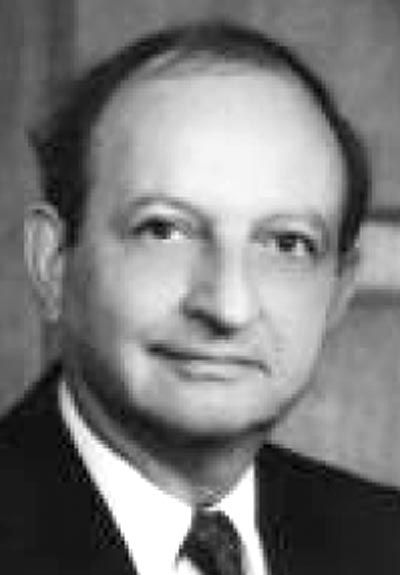
(1924-2011)
Currently Emeritus Professor of Anaesthesia at Queen’s University in Kingston, in an expanding career Dr Stuart Vandewater made innumerable contributions to Canadian anesthesia and to administrative and organizational aspects of Canadian medicine. His career shows how an anesthesiologist can influence activities that are far removed from the operating room.
Born in Campbellford, Ontario, on November 16, 1924, Dr Vandewater and his wife Mary (née Baird), have two children, Steven Paul and Mary Leslie and two grandchildren. He was educated at Frankland Public School and Jarvis Collegiate Institute in Toronto and graduated from the University of Toronto in 1947. After a rotating internship at the Toronto General Hospital, Dr Vandewater joined the newly formalized Toronto anesthesia residency program under Dr Harry Shields, rotating through the various teaching hospitals. Additional training included his appointment as a registrar at the Edinburgh Royal Infirmary under Sir James Learmonth and Dr John Gillies (with emphasis on induced hypotension), a residency in internal medicine at Sunnybrook Medical Centre, and an R.S. McLaughlin Fellowship (in 1952-1953, the charter year) at Toronto General Hospital, concentrating on thoracic surgery with Dr F.G. Kergin. He became a Fellow of the Royal College of Physicians and Surgeons of Canada in 1953 and joined the Toronto faculty and staff, working at the Toronto General Hospital. While in Toronto he was, over the next seven years, a member of the team responsible for the introduction and use of hypothermia (and hypotension) in neurosurgery for cerebral aneurysms, with Dr Harry Botterell and Dr William Lougheed.
Dr Vandewater was appointed Professor and Head of the first Department of Anesthesiology at Queen’s University in 1960. Over the next three decades he was a participant and a witness in the maturation of the specialty into a professionally recognized, applauded and attractive medical discipline. The author or coauthor of many scientific articles, editorials and book chapters, many of his important contributions were made outside the operating room. These include those to medical education as well as the specialty of anesthesia in Canada through the Canadian Anesthesiologists’ Society (CAS), the Royal College of Physicians and Surgeons of Canada, Queen’s University and the Association of Canadian Medical Colleges.
Dr Vandewater contributed substantially to the development of anesthesia through the CAS, particularly in the expansive and exciting times of the 1960s and 1970s. As a member of several committees, the Society’s president for 1967-1968 and then its secretary from 1972 to 1977, he was close to the centre of many events that shaped the specialty as we know it today. He was a tower of strength in the drafting and acceptance of a new constitution for the Society, and he led the heads of departments in an association that evolved into the present Association of Canadian University Departments of Anaesthesia. He was active in the Royal College, being an examiner (1962-69), chair of the specialty committee (1968-80) and a member of the credentials committee (1976-82). He chaired other national and provincial anesthesia manpower committees, taking part in major multidisciplinary studies. Dr Vandewater subsequently became a certificant of the American Board of Anesthesiology and a Fellow of the Royal College of Anaesthesia, and the Canadian Society recognized the value of his contributions by awarding him its Gold Medal for Meritorious Services in 1981.
In the latter part of his active years at Queen’s, Dr Vandewater was Secretary to the Faculty of Medicine, Associate Dean for Postgraduate Affairs, Director of Continuing Education for Health Sciences, and the university’s representative on the Medical Council of Canada and the Council of The College of Physicians and Surgeons of Ontario. He ended his active career at Queen’s as the director of the university’s sesquicentennial celebrations, which included arranging an official visit of Charles and Diana, The Prince and Princess of Wales, in 1991 and 1992.
In medical education Dr Vandewater was the first chairman of the Committee on Accreditation of Canadian Medical Schools (ACMCICMA); he was also the Canadian voting member of the Liaison Committee on Medical Education (AAMCICMA), the recognized authority on setting standards and content for medical education and accrediting MD programs in the US and Canada from 1982 to 1988. This activity required reviews and written comments of all accreditation reports, membership on survey teams and attendance at quarterly meetings in Washington or Chicago, and Ottawa. Finally, he represented the Association of Universities and Colleges of Canada on the Board of Accreditation, Canadian University Schools of Nursing, 1994-1996. Currently, Dr Vandewater is a member of the Board of Directors of the Kingston General Hospital, and of Associated Medical Services Inc., (Hannah Institute for the History of Medicine).
Dr Vandewater, who is a life member of Phi Chi medical fraternity, was presented with the Queen Elizabeth II Medal in 1997 and Queen’s University Council’s Distinguished Service Award in 1992. Together with the Society’s Gold Medal, these are an indication of the esteem in which he is held by his colleagues, both in the specialty of anesthesia and in the medical profession in Canada.
David A.E. Shephard MB FRCPC, Charlottetown, Prince Edward Island
CAN J ANESTH 1999 / 47: 8 / pp 823–824